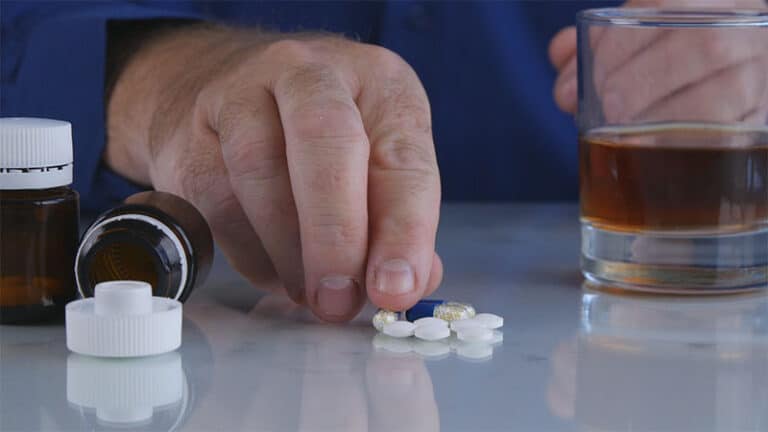When you’re prescribed antibiotics, it usually means your body is fighting off an infection and needs a little help to recover. But many people wonder: Can you drink alcohol while taking antibiotics? The short answer is not always.
Depending on the medication, mixing alcohol with antibiotics can cause side effects, reduce how well the drug works, and even lead to serious health risks.
In this post, we’ll explore why mixing alcohol with antibiotics is generally discouraged, which combinations are especially risky, and how alcohol can impact your treatment.
Our Alcohol Addiction Treatment Centers

Scottsdale Rehab
Luxury Personalized Rehab

HART Rehab
Holistic Luxury Personalized Rehab

Scottsdale Detox
Luxury Medical Detox
What are Antibiotics and How Do They Work?
Antibiotics are prescription medications used to treat bacterial infections like urinary tract infections, skin infections, strep throat, and pneumonia. They work by killing bacteria or preventing them from multiplying, helping your immune system clear the infection.
Different types of antibiotics target specific bacteria. It’s important to take antibiotics exactly as prescribed to avoid resistance or incomplete treatment. Skipping doses or mixing them with certain substances, like alcoholic beverages, can interfere with how the antibiotic works.
How Does Alcohol Affect Antibiotics?
Alcohol doesn’t make antibiotics completely useless, but it can interfere with the healing process. There are two major ways the effects of alcohol can affect your recovery:
1. Interference with Medication Breakdown
Your liver processes both alcohol and many antibiotics. When you consume alcohol, it competes with the antibiotic for metabolism in the liver. This may reduce the drug’s effectiveness or increase its toxicity.
2. Increased Risk of Side Effects
Some antibiotics already cause side effects like dizziness, nausea, or stomach issues. Adding alcohol to the mix can amplify these effects. This may lead to serious symptoms, especially if you’re dehydrated, tired, or already feeling unwell.
Can You Drink Alcohol While Taking Antibiotics?
Drinking alcohol while taking antibiotics can generally be done in moderation for most antibiotics, but it is not always advisable.
For most antibiotics, moderate alcohol consumption is unlikely to cause significant harm or reduce the effectiveness of the antibiotic. However, it is generally recommended to avoid alcohol, especially when feeling unwell or taking medication. Consuming alcohol can complicate the healing process.
Always consult with your healthcare provider before consuming alcohol while on antibiotics to ensure safety and avoid potential interactions. Additionally, check for alcohol warnings on your medication packaging.
Dangers of Mixing Alcohol and Antibiotics
For some antibiotics, mixing alcohol isn’t just a bad idea—it can be dangerous. Certain antibiotics react with alcohol and cause severe symptoms. These reactions can be life-threatening in some cases.
Here are the most dangerous combinations:
Metronidazole (Flagyl) and Tinidazole (Tindamax)
These are commonly used for dental infections, skin infections, and certain urinary tract infections. Mixing alcohol with metronidazole (Flagyl) or tinidazole (Tindamax) can trigger a disulfiram-like reaction.
Symptoms include:
- Nausea and vomiting
- Severe headache
- Flushing of the skin
- Rapid heart rate
- Drop in blood pressure
- Abdominal cramps
This reaction can occur with even a small amount of alcohol and may last several hours.
Other Antibiotics and Alcohol Interaction
- Cefotetan: Similar to metronidazole, this antibiotic can also cause adverse reactions with alcohol.
- Linezolid: Undistilled alcoholic beverages may interact with this antibiotic
- Griseofulvin: May cause unpleasant reactions.
- Azithromycin: May cause dizziness or drowsiness when combined with alcohol.
- Doxycycline: Alcohol may reduce its effectiveness, especially with long-term use.
These may not always cause severe reactions, but can still make you feel very sick when combined with alcohol.
How Long After Taking Antibiotics Can You Drink Alcohol?
If your antibiotic does not have a direct interaction with alcohol, it may be safe to have a drink after finishing your treatment. However, you should always wait to be sure the drug is fully out of your system.
General Guideline:
Wait at least 48–72 hours after your final dose before consuming alcohol. This gives your body time to clear the medication and reduces the risk of delayed reactions.
For metronidazole (Flagyl) and tinidazole (Tindamax), it’s best to wait a full 72 hours, as these drugs stay in your system longer.
Alcohol and the Immune System: Why It's Best to Wait
Even if you’re not on a high-risk antibiotic, consuming alcohol while sick can delay recovery.
Here’s why:
- Alcohol suppresses the immune system, making it harder for your body to fight infection.
- It dehydrates you, which may worsen symptoms like headache or fatigue.
- It disturbs sleep, slowing healing.
- It can lower blood pressure, especially when dehydrated or weak from illness.
In other words, drinking can make you feel worse and stay sick longer.
Should You Drink on Antibiotics?
In most cases, avoiding alcohol during antibiotic treatment is the safest choice. While a single drink might not cause harm with some medications, it’s often not worth the risk, especially if you’re already feeling unwell.
Talk to your doctor or pharmacist if you’re unsure whether drinking is safe. When in doubt, it’s always best to hold off on alcoholic beverages until you’ve completed your treatment and your body has had time to recover.


